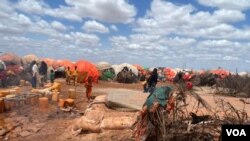The United Nations is calling for a significant and rapid scale up of humanitarian assistance to prevent a famine in Somalia that could result in a devastating loss of life.
The latest U.N. food and nutritional analysis released Monday warns more than a million people in the Bay Region in southcentral Somalia are on the verge of famine.
That is the third drought facing Somalia in a decade. UNICEF Somalia Representative Wafaa Saeed says repercussions from the current drought will be disastrous if international support is not significant and immediate.
“This drought is actually worse than the drought of 2011 where we had 250,000 people lost their lives, half of them children," Saeed said. "It is worse because it is more in severity. It has lasted longer and is impacting larger areas. I have actually spoken to people who are over 70 years of age who told me that they have never seen such a bad drought in their lifetime.”
The U.N. children’s fund says malnutrition has reached crisis levels. It says 1.5 million children, nearly half of the under-five population, are acutely malnourished. It warns some 385,000 children suffering from severe acute malnutrition are at risk of death without special nutritional treatment.
Speaking in the Somali capital, Mogadishu, Saeed says some 730 children are reported to have died in food and nutrition centers across the country. She adds the number is probably higher because many deaths go unreported.
She says the worsening malnutrition crisis, coupled with a worsening water and sanitation crisis, makes children particularly vulnerable to deadly outbreaks of disease.
“We are really very much concerned about this because we are also seeing increasing outbreak of watery diarrhea," Saeed said. "There are more than 8,400 cases this year and around 13,000 cases of measles. And the cases of measles this year alone is more than what has been reported in 2020 and 2021 combined.”
Another matter of concern is the large number of children likely to miss an education. UNICEF says more than three million children are directly affected by drought and 900,000, half of them girls, are at risk of dropping out of school. It notes 90 percent of those who drop out never return to school.
The U.N. children’s agency says only 65 percent of its $112 million appeal is funded and less than a third of the United Nations overall appeal for $1 billion has been received. The agency says donors must step up and respond generously to this overarching emergency to stop the worst from happening.






